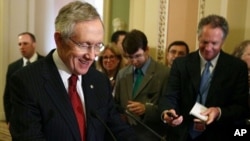Economists say the new agreement to cut some U.S. spending and allow the government to borrow more money is just the first of many steps needed to solve the debt and deficit issue.
The agreement cuts around $1 trillion in spending over the next ten years and mandates a complex process intended to bring another $1.5 trillion in deficit reductions.
The head of the world's largest bond mutual fund says the agreement does not put a "significant dent" in U.S. spending next year. Writing on the PIMCO company website, Bill Gross says it will take trillions of dollars in further deficit reduction for the United States to keep its top-level credit rating. He says the government could depreciate the currency or use inflation to ease the burden of repaying the huge debt.
China's government, which holds trillions of dollars in U.S. debt, says the agreement is "good news" for the U.S. and global economies, but makes only a "small dent" in the nation's huge debt. The commentary appeared on the government-controlled People's Daily website. It urges Washington to "live within its means." It says sharp budget cuts could hurt economic growth and raise unemployment in the short term, but are necessary for the health of the economy.
An article in The Boston Globe, says national government spending cuts could raise unemployment and hurt the economy in Massachusetts, which has many military, medical, and educational institutions funded by Washington.
But other experts say the impact will not be felt for some time because the cuts over the next two years amount to tens of billions of dollars, a small percentage of federal government spending. Deeper cuts are set for later years.
Some information for this report provided by AFP.
Economists: US Must Do More To Cut Deficit & Debt




